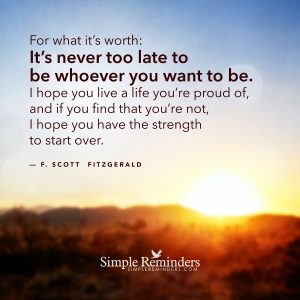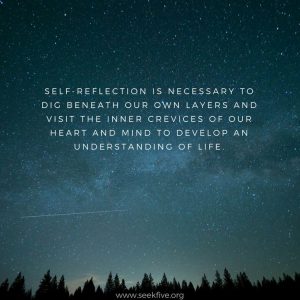Today is Fat Tuesday. Most folks simply associate today with a big huge party in the commercialized view of Cajun and Creole culture. But, Fat Tuesday, while an occasion for celebration before the Lenten Fast, also marks the beginning of a time of intense reflection.**
Reflection is a common term that we use in a lot of different ways in regards to teaching and research. We talk about being “reflective practitioners” (ala Schon) and incorporating reflection into our teaching practices and asking students to reflect on their own learning experiences. We use reflexive when we want to specifically talk about our positionality as a researcher within the research process. Reflection is a key component of understanding our work and how we can do our work better.
But it seems that sometimes we forget to turn that reflective lens onto wholeness of our lives. That is, we forget that we need to pause regularly, to reflect on our decisions and work practices. The goal of this sort of reflection is to ensure that we are matching our own values about work and life to the actual work and life we are leading. This sort of personal reflection is key to moving toward a better balance between different aspects of our lives and more so pushing back against the cult of overproduction.
Fat Tuesday is a marker for me. Not only does it start this personal and spiritual time of reflection, I have always used marker to pause and to reflect on my work life. While the date of Fat Tuesday shifts, it always comes at the time of the term when we start to feel a bit overwhelmed. It’s also conference season for many of us, which means airport sitting (or driving) time where you may have the space to think. And as spring is close by, people often start to at least dream of warm weather and summer projects. All of these things together make now the perfect time to pause to reflect.
To make the most of this reflection time, following is a strategy that may be useful:
Take an honest look at your current schedule
Figure out what needs to go and to stay and what you can reasonably do or get done. Ti seems pretty common that there comes a time in the term (every term 🙂 that we end up looking at our planners of to-do lists and we simply feel like we’re drowning in work (or the snowball effect) and there’s no way to get it all done. Often, though, if we take an honest look at the schedule, we realize that there is a lot on there that may not need to be done right now. That there are also things that can easily be delegated or set aside for another time. When I say honest look, this is necessary part of reflection in really considering what that task is and why you are doing it.
An honest full assessment helps you to prioritize those things that truly need to get done (be it research, teaching related, service or administrative related) and then figure out ways to get them done. Then, the schedule becomes more accurate and you can see more clearly what else you can realistically take on at the moment. This honest, realistic reflection on your schedule can go a long way in reducing angst and worry because it helps you prioritize.
And once you have a plan. Start implementing it from letting people know that need to know to getting through big projects via smaller tasks.
Look at your current schedule in light of your larger goals
The looking reflective process of looking at your schedule then should lead to a bigger reflective process where you consider your current schedule in light of your larger, strategic career goals.
We often times miss the forest because we are so focused on the trees. Now is a great time to re-align or work toward re-aligning your schedule and workflow with your larger goals. Are you doing things that make you angsty and depressed? Then now is the time to look critically and carefully at whether you need to continue to do those things. Go ahead and make adjustments or make a note or list that you’ll revisit at the start of summer. The goal here is for you to try and realign your daily life with getting to your larger goals. This often means considering on exit strategies for some things you may be doing that you need to let go of so you can open up more space for the things you want and need to do.
 Integrate one new thing that is just for you
Integrate one new thing that is just for you
Research tells us that it doesn’t really take that long to build up a habit. One of the things that I’ve used the Lenten season for is to re-make a habit. By the end, whatever it is has been set into the mind and body as a routine and habit. You may want to use this opportunity to integrate a new exercise or an extra walk or an extra yoga class that you often think you don’t’ have time for. Or you could make the time to volunteer at a place that means a lot to you. Maybe start a new hobby or pick up a craft project that has been sitting dormant. Or plan to read more for fun or simply sit and watch tv.
The point is that when we take time to pause and to reflect we often can see how we can insert one new thing into life that can potentially bring us much joy and satisfaction.
I so hope that you can find the time and space to pause to reflect.
Wishing you health, joy, and peace.
Happy Mardi Gras!


